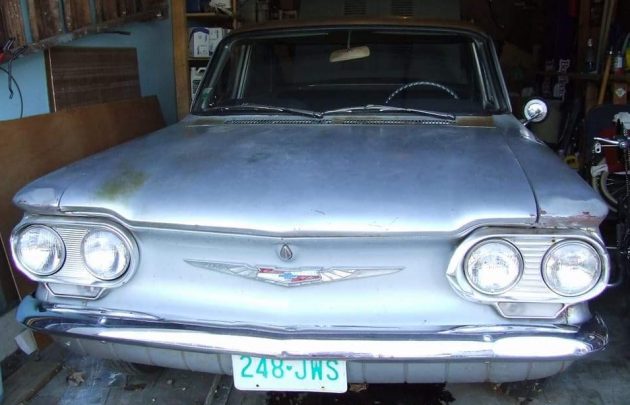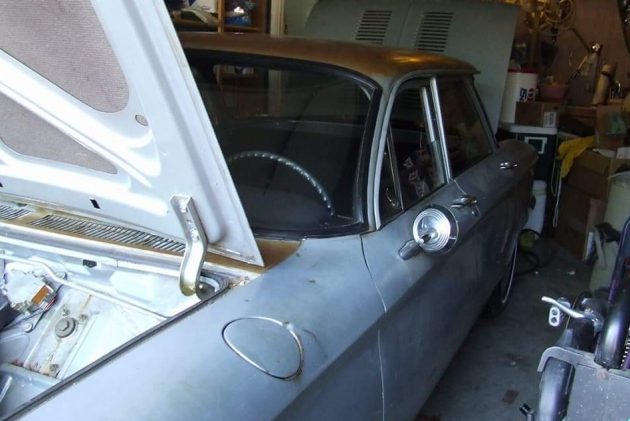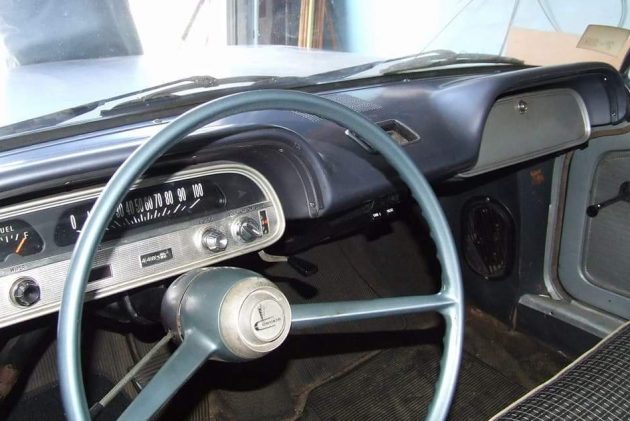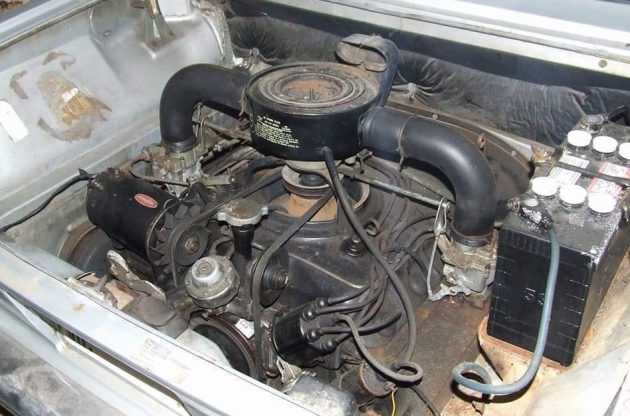For a while, I collected first editions. The prize on my little shelf of books was Hemingway’s “For Whom the Bell Tolls”. My ex-wife got it. Perhaps that’s why I’m more interested these days in building a car collection of freshman year first edition beauties, like 1960 Chevrolet Corvair found here on eBay, than books.
It’s without a doubt that I have a pension for year engine cars – ok, Porsches – but since the Chevy Corvair is the only American made production car with a rear mounted air-cooled engine, I’ve always had a soft spot for it. Produced for 9 years, we all know it’s nearly decade long run was fraught with controversy after Ralph Nader’s 1965 book “Unsafe at Any Speed”.
Although the little “push me, pull me” style car’s (think Fiat 124 where the front is the same as the back) are all but gone, the Corvair remains an affordable classic that still garners more attention than retail price. This true barn find survivor, a one family original with only 44k miles, is going for only $3k or best offer. And one in show quality shape runs in the high teens.
Although I’d probably prefer the convertible version of the 1960 model, I’d keep the wonderful Horizon Blue hue, and follow the lead of a gentleman who has a perfectly preserved identical Corvair in Hermosa Beach, CA – complete with an original “Nixon/Lodge” bumper sticker from that year’s famous election. These little cars are cute, collectible – and perhaps best of all a cheap way to get into a classic.








” i have a pension for year engine cars ” …sounds like bad closed caption TV… ” I have a PENCHANT for REAR engine cars ” …Just sayin ‘ …
It seems that Garr was an unfortunate victim of auto-correct.
You may not know the full story here. Maybe he was going to take his retirement money and buy the car!
Maybe he’s using his retirement pension to indulge in his hobby.
Hopefully there is a copy of Unsafe at any Speed by Ralph Nader in the glove box. If not there should be. Sad a revolutionary car by the king of automakers (at the time) to design and build a car to directly compete with the evil VW Beetle and engineer it with a major design flaw. It took them years of complaining and many deaths and court hearings to change the design. By the time they did the reputation of the Corvair was ruined. Many still like them and those that do understand them and keep them running.Not for me. I would rather have a Vega or an 1984 Corvette. Although a Citation or 4/6/8 Cadillac sounds good too.
Yikes, AMCFAN. I am very live and let live, but a 4/6/8 Cadillac? Surely you jest.
Haha Grant I was joking….really!
I’m with you on the ‘oddballs’ .. I have a soft spot for the automotive oddities, orphans, and the unloved!
Vega/Astre, Citation [X-Bodies], the Caddy V8-6-4, the ill-mannered GM diesels of the late 70s, Aztek, Geo Metro, and … Yugo!
All cars need someone to love them!
I could go for the Yugo, but never an Aztek.
By the way I never head anything bad about the 4/6/8 Cadillacs. Most have been bypassed, which happened the same year as manufacturer, and you have a strong car.
The 4.1 was crap on a stick.
Proven over and over no design flaw, perfectly safe. By the Federal Highway Safety administration.
All false, buddy. Nader was wrong. The NHTSA proved it. An independent panel of engineers proved it. Even Chaparral Racing had a hand in the research and testing. Nader himself, not to proud to admit he was proven wrong, came out and said his claims were incorrect.
You folks need to quit with the false info on this car. You’re giving it a black eye it never deserved.
I acquired and restored a 1960 Corvair sedan (700), here in France. I’m driving her since several years and I can say the Corvair is a good and safe car:
– if you know the difference between a rear engine car and others (luckily, I learned to drive on a VW Beetle), same with a front wheel drive one
– if you have the tires pressure right (more on the front wheels), just check the car booklet (radial tires help a lot)
– if you know the limits (I tried on roundabouts, in dry and wet conditions).
Nader was basically right but the Corvair made a sad target. Sorry GM stopped, they had what is needed to make an american Porsche…
AMCFan, I wonder where you get your information. Maybe “I read it on the internet so it must be true”.
I’ve done a 180 in one, but only because the road was wet.In a ’62 coupe, I drag raced a souped up VW bug up “dead man’s hill” and won handily. Safer handling only requires the correct tire pressures (less in front). As far as the “major design flaw”, both Beetles and Corvairs had swing axles.
And Mercedes. And Lotus. And Triumph. And Porsche. And on and on and on! :)
My sis’s girlfriend had one of these back in ’65 with a leaky exhaust. We should have headed to the hyperbaric chamber on our way back home.
My second cousin’s best friends uncle’s mother-in-law had one with that problem………..Yeah, sure.
In 1972, the NHTA disproved Nader’s claim that the Corvair was ‘unsafe at any speed’ after a two year study and found the car to be at least as safe as comparable cars of that era.
There was no 1960 convertible
Amen. The first convertible was the 1962 Spyder.
I have a question for those who have actually owned and driven Corvairs – how well does the heat work? I’m just curious to see how they compared to the VW competitors.
I remember the bus (a ’71 Westfalia) heat really didn’t do much on really cold days, but the bugs were a bit better.
How did the Corvair compare?
Oh, and this is a neat car. Seems like a good entry level collectible at a low price.
– John
All I can tell you is that my 65 corvair convertible was king at letting smoke into the car when the heater was turned on! To leave it running long enough to allow in heat would have meant certain suffocation with the top and windows up!
I used to have a ’64 Corvair. It’s been decades now but as I recall the heat was a little bit better than on a VW since the Corvair had a blower, but not all that much better and it always reeked of oil and exhaust fumes.
Early Corvairs had an optional gasoline-fired heater available that lived in the trunk and provided plenty of heat.
If it had an odor, that was the owner’s fault for not fixing the oil leak. Heat was OK depending where you lived. In -20F Chicago winters it was not good. In Atlanta, pretty good. Sort of like a water cooled Chevy with a 160 degree thermostat.
Just like the Volkswagon. Not much heat to begin with. When the push rod tube seals start to leak you got smoked out. My stock 62 Corvair would leave my VW buddies half the distance.
For Ohio winters it worked very well, at least until age began to deteriorate some of the systems. I learned to drive in a ’66 Corsa (still own it, but in storage) and defrosting in the cold months was pretty good.
The smoke usually came as a result of leaking pushrod tube o-ring seals. It was a materials problem which Viton seals cured, but not until after the cars weren’t being made anymore. Unless somehow damaged, I’m not aware of anyone who ever had a problem with CO coming from the exhaust into the heater system.
The second issue for non-performance was failed control bellows for the cooling air exit doors at the back of the lower shrouds. Failure mode was open, and the warm air would exit without making it into the passenger compartment. The sheet-metal shrouding which surrounded the aluminum air-cooled motor needed to be properly sealed and in good condition.
One way to improve the flow of warm air was to replace the heater blower fan with a higher RPM and volume motor/squirrel cage.
In the 60’s my family had a Corvair Greenbrier, a VW Beetle and a ’65 Impala 327. In the winter if you wanted snow traction the Greenbrier or especially the Beetle was the ticket, but if you wanted to be warm, definitely the Impala. I distinctly remember that gas fumes seemed to come into the Beetle, it was very unpleasant. I don’t recall on the Greenbrier.
On my 66, there was a little piece of sheet metal mounted above the oil cooler that was supposed to be reversed in winter to make the air recirculate in the engine compartment. I could never notice any difference. Heat was weak and on one cold trip, unless it was directed to the windshield, it literally felt like there was no glass there.
Built 1st week of May, 1960. It’s older than I am and looks better too!
Love it when sellers include a picture of the cowl tag. Should be mandatory for any used car sale.
John, the heater actually worked quite well (I had two Corvairs in the 70’s in high school). Problem is, instead of designing the heater with a heat exchanger as VW did, GM saved a few bucks and did without. So if a Corvair has even a tiny leak in a head gasket or exhaust gasket, you’re a goner. I started getting groggy while sitting in the parking lot in high school and fortunately knew enough to open the windows. A few weeks later I had installed a junkyard gasoline heater in my car and could then sit in toasty comfort with the engine off. The gas heater was standard in 1960 and an option afterwards. Find one in good shape and it’s the solution to the Corvair heater issue.
60 Models HAD GASOLINE HEATERS THAT WILL RUN YOU OUT OF THE CAR
And crack the windshield, if it is iced and the gas heater is turned on full blast right away….
A friend found that out the hard way. :-/
the beetle had heat troughs. had 1 was not a winter car for heat . however i had a 66 corvair convertible show car, heat was forced thru large hoses to front & rear pass. areas drove it to a world of wheels show with 20 degree temp. warm as toast. don,t know about early models except 60 & maybe 61 had gas heaters.
Quick correct to Garr: the Corvair had 10 model years (1960 thru 1969).
In response to some of the above comments, Corvairs – if properly-maintained – run great. That said, the heating is definitely an issue. All of mine (7) have been LMs (late models – 1965-1969), so I cannot speak to the heating in the EMs.
As for the safety issue, Nader’s complaints (yes, I have read “Unsafe at Any Speed”) were addressed by the 1965 model year (some would say by the 1964 model year).
As for this 1960, $3k seems full value. There are better condition EMs for sale out there for just a few $1000 more. In fact, the interest in Corvairs is more heavily tilted toward LMs than EMs. So I would think that if you are interested in this 1960, don’t overbid.
I love the look of the caveman cars, but buyer beware. I had found one identical to this. It was a barn find that had been stored in an airplane hanger for 3 decades. It looked great until I pulled the rubber floor mats. Full rusted floors from front to back.
For $3K it’s probably good buying, although I’d rather pay a bit more and have a mid-year coupe with a stick – just a personal preference.
Around 25 years ago, a young kid bought and restored a ’60 coupe but couldn’t get it to run right. A buddy of mine, who did the body repairs and paint, sent him around to my house. I think it took me just under ten minutes with my trusty Uni-Syn to have it running like the proverbial watch. The guy was amazed at how simple it was to fix…
In 31 years of Corvair Ownership I’ve never used a Uni-Syn.
A friend taught me to use just a piece of garden hose and my ear. Works just dandy.
The Uni-Syn really does make life easier.
Just a note that there were no convertible Corvairs until 1962. It appears that this one is a 500 series sedan, the cheapest series, which is unusual and collectible today, because nobody saved these.
By the way, in the book Unsafe at any Speed, only pages 120, 121, and 122 are about the swing axle Corvair. The rest of the book deals with the rest of the auto industry at the time.
Proper maintenance is the key word here, especially tire pressure.
On the night of February 12, 1968 I was in the passenger seat of a ‘63 Spyder Convertible. My friend drove too fast into an S curve. The car got sideways and turned over. Thank goodness the windshield frame was strong. I had on a seatbelt and his seat back broke and he ended up in the back seat area. We were not injured. Instead of being a statistic at age 16, I am now 66.
Obviously not the car’s fault.
Ralph Nader was a conscientious extremist, the kind of catalyst for change who stretched the truth a bit to be effective. I’m not a fan of these people but to an extent they are necessary for social progress.
The primary indictment of the Corvair was the swing axle rear suspension. The diagrams in the book, Unsafe at Any Speed, bore no relation to reality as the angles depicted were far beyond the limits of the suspension. GM did effect a solution to correct the travel by the simple expedient of a transverse spring attached under the rear end.
My recollection was that the multi-directional fan belt was one of the bigger issues. I never had a problem with mine, but I didn’t own the car for long. The Late Models are one of the best small car designs ever. The early models were revolutionary, but just not as pretty.
Exactly!
And yes, the fan belt is really the only problem I’ve ever encountered on these cars. But if you have good pulleys, it’s no problem… though the belt does wear faster than a conventional-routed belt. I’ve had my engine near 6,000 rpm with no problems.
I’ve actually never had any of the oily heater problems either… though I’m sure they do crop up. Coming from AZ and SoCal, it’s not really an issue.
Later there were guides on the top cover and the idler.
Now there are “Spring Loaded Idlers.
It has been 25 years at least since I threw a belt. And it was b/c there was oil everywhere. . A bad front engine seal was the culprit.
Use Gates “wrapped” Belts and you’re good to go.
My first car was a 64 Corvair it was great wish I still had it but I now have a 65 Mustang conv. for the last 25 years. Never get rid of it
I’m not sure if any of you guys are aware of film footage of a then-new Falcon and a Corvair being run on Ford’s Proving Grounds. In the film, the ‘Vair kept spinning out, behind the Ford.
Nader saw the footage and claimed he had ‘proof’ that the Corvair was dangerous…
…When the Ford engineers finally stopped laughing at his remarks, they openly admitted that the driver of the Chevy was intentionally putting his car into a slide. Apparently, Ford’s Top Brass was worried that their car wouldn’t be competitive against the Chevrolet compact and this so-called ‘test’ was done to allay their fears.
Car & Driver magazine did a story on this back in the 1970s. It’s worth a read.
Author, the Corvair was built from 60 to 69. That’s 10 years, not 9 years. It was a full decade of production and nearly 2 million cars.
Ralph Nader has never had a driver’s license in his life and thus could not drive the car he wrote so much about. What would he know about a car’s handling anyway? I would guess he’d be a lousy, timid driver if allowed behind the wheel!
To be fair, it was only one chapter of the book. GM just blew things up by having Nader followed by PIs and pretty women, hoping to defame him.
The good news is cars are safer today in huge part due to folks like Ralph Nader. Nader is all-at-once a model American and ignorant joke.
Wow – lots of great responses to my heat question. I appreciate everyone who shared their experience and expertise. One of those things I’ve wondered about for years and now I know.
A Corvair convertible is still on my bucket list of cars to own. I like the styling of the ’65 and up.
– John
John, LM (65-69) convertibles are theoretically fun, but having owned one (a ’66 4-speed, 110hp, deep blue w/ black interior and black top), the big concern is the behind-the-scenes rust. Poor design allowed water and debris to cascade behind the door hinges. So if you are looking one over and the doors do not effortlessly close, walk away.
Another little trick that helps…..on late models, replace the std. blower motor with an A/C blower motor from a full size Chevy. Higher volume unit that gets heat moving faster.
At the age of 12 I learned all about swing axle rear suspension the hard way. Rolled my Renault 4 CV twice in the same spot on 2 different occasions. Once you know how the negative camber on the outside can be your friend. Just don’t let off the gas mid-stream.
Why, oh why, do the early model barn finds have to be the ubiquitous blue sedan, 2 spd Powerglide? My 1961 Lakewood field find in 1988 had a three speed and even with no working synchro could pull itself up out of the dirt and was a beautiful yellow.
I’m not sure the >>very first<< Vair convert was the 62 Spyder. Didn't the 62 Monza convertible launch concurrently with the Spyder?
My mother had a ’60 just like this, color and all. Loved driving it, much more stable than uncles’ Porsche, much more powerful than any VW of the time, much bigger and faster than a Karman Ghia. Tire pressure was the key to safe handling – something like 15 lb in the front and 32 in the rear. Great in snow. By the time it was 6 years old gas heater in the “trunk” (in the front) spewed fumes in to the passenger area but did defrost the windshield – technique was to balance hot air from heater with cold air from having window open so you would not die. Saw one coming at me, maybe about 50 mph for each of us, do the dreaded 180, actually a 360, on a dry, flat, straight, but windy road, rear end hiked up and wheels tucked under, ended up face to face at a dead stop in the my breakdown lane. Saw a Renault Dauphine do the same thing, rear end hiked up, rear wheels tucked under, did a 360 fortunately didn’t hit any one else. Original design had the rod under the rear axle to avoid the tuck in, GM bean counters “value engineered it out”, went in the ’64 and later ones.
One more on heaters. My best of both worlds 65 Greenbrier came with a gas heater. After a while found another 95 Van in the boneyard and pulled the hot air heater out of it and added it to the ‘Brier. Now that was comfortable.